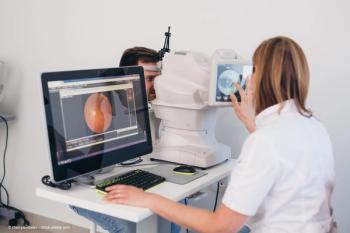
Bariatric surgery may reduce diabetic retinopathy risk
According to review, patients with mild diabetic retinopathy at baseline fare better.
Reviewed by Caberry Weiyang Yu, MD.
Diabetic retinopathy (DR) is a threat to vision in patients with type 2 diabetes, and a cause of lost sleep for ophthalmologists when they can’t save patients’ vision.
A bright spot is that bariatric surgery is an effective treatment for obesity in patients with type 2 diabetes. It can induce remission of the diabetes and reduce other microvascular complications, according to Caberry Weiyang Yu, MD, of the Division of Ophthalmology, Department of Surgery at McMaster University in Toronto, and colleagues.
One drawback may be the suggestion that DR can worsen after bariatric surgery as a result of the rapid improvement in hyperglycemia, but this is not yet definitive, according to Yu.
In light of this, Yu and her colleagues performed a systemic review and meta-analysis to determine the impact of bariatric surgery on DR for an obese diabetic population compared with controls treated with medical therapy.
The investigators conducted a search of the MEDLINE, Embase, Cochrane Library, and Web of Science databases up to March 2020, for studies that compared patients with DR who had undergone bariatric surgery with those treated medically.
The primary outcomes were the prevalence rates of all cases of DR and sight-threatening DR postoperatively; the secondary outcomes were worsening of DR within 12 months and thereafter. Sight-threatening DR was defined as proliferative or preproliferative DR or diabetic maculopathy or severe nonproliferative DR.
A total of 14 studies that included 110,300 surgical patients and 252,289 control patients were identified; all studies had a low risk of bias. Almost three-quarters of the patients with type 2 diabetes were women (mean age, 42.6 years; mean body mass indices [BMIs] preoperatively and postoperatively, 44.8 and 30.5 kg/m2, respectively). The difference in preoperative BMIs compared with postoperative BMIs was a reduction of 31.9%.
Four types of bariatric surgeries were performed among the identified studies: Roux-en-Y gastric bypass, laparoscopic sleeve gastrectomy, laparoscopic adjustable gastric bypass, and biliopancreatic diversion.
Primary and secondary outcomes
At follow-up, Yu reported that the DR prevalence rates were 0.45% for bariatric surgery and 1.03% for medical management.
“The risk of having any DR for the surgical patients was 83% compared with nonsurgical patients at a median follow-up of 8 years,” she reported.
Moreover, undergoing bariatric surgery was seen to reduce the prevalence of sight-threatening DR by 53% at the median follow-up of 4 years compared with patients treated medically.
Regarding the risk of early progression of DR, particularly within 12 months and associated with bariatric surgery, Yu reported that the DR progressed to sight-threatening DR more often in patients whose DR was severe at baseline. In patients with baseline nonproliferative DR, early progression of all DR did not differ between the 2 study groups, occurring in about 1 of 7 patients.
However, in those with existing proliferative DR at baseline, complications such as intraocular hemorrhage developed in 4 of 5 patients during the first year.
After the 12-month time point, significantly fewer patients (71%) who underwent bariatric surgery had worsening of DR at a median of 5 years. Progression occurred in up to 8% of patients followed for between 2 to 13 years postoperatively.
“In obese patients with type 2 diabetes, bariatric surgery was associated with fewer cases of all and sight-threatening DR,” Yu concluded. “The severity of the baseline DR was an important sign of early worsening of DR postoperatively. Early screening for patients with existing sight-threatening DR who undergo bariatric surgery is needed.”
Caberry Weiyang Yu, MD
P: 905/521-2100
This article is adapted from Dr Yu’s presentation at the American Academy of Ophthalmology annual meeting in New Orleans, Louisiana. Dr Yu has no financial interest in this subject matter.
Newsletter
Keep your retina practice on the forefront—subscribe for expert analysis and emerging trends in retinal disease management.

































